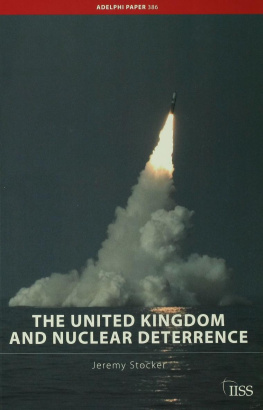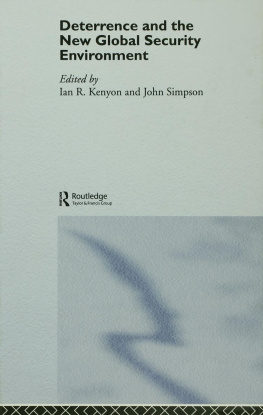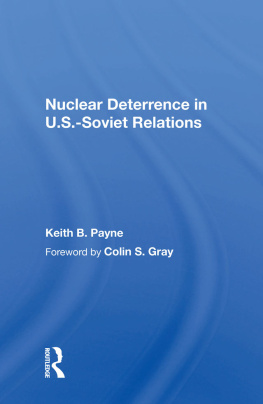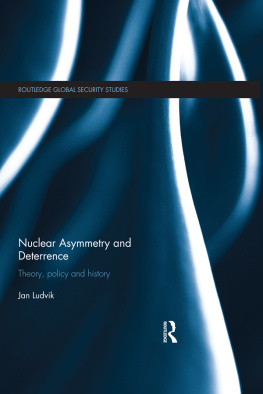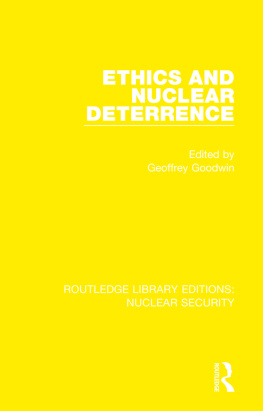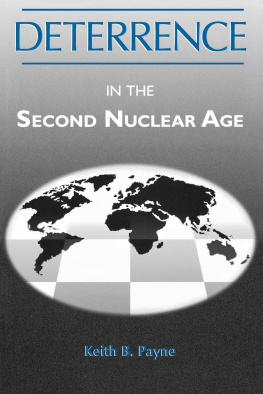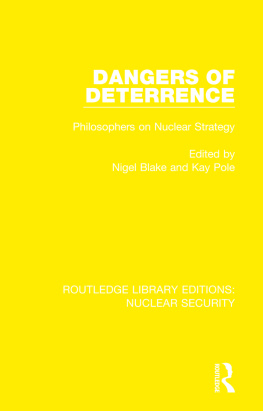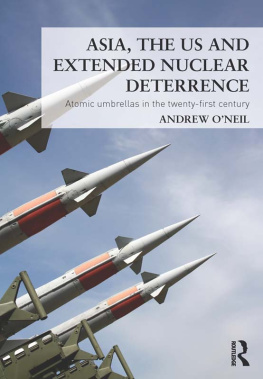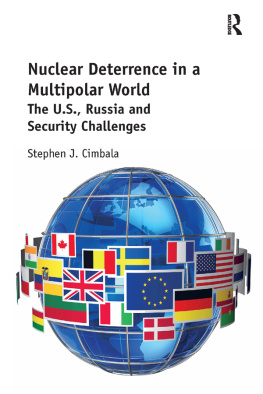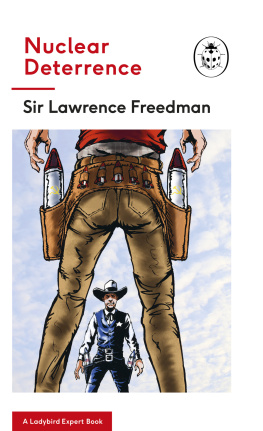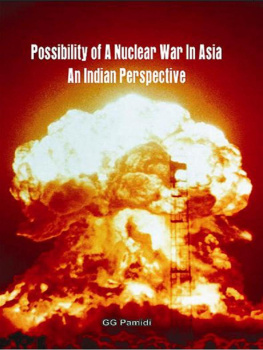The United Kingdom and Nuclear Deterrence
Jeremy Stocker
ADELPHI PAPER 386
The International Institute for Strategic Studies
Arundel House 13-15 Arundel Street Temple Place London WC2R3DX UK
ADELPHI PAPER 386
First published February 2007
by Routledge
4 Park Square, Milton Park, Abingdon, Oxon, OX14 4RN
for The International Institute for Strategic Studies
Arundel House, 13-15 Arundel Street, Temple Place, London, WC2R3DX, UK
www.iiss.org
Simultaneously published in the USA and Canada by Routledge
270 Madison Ave., New York, NY 10016
Routledge is an imprint of Taylor & Francis, an Informa Business
2007 The International Institute for Strategic Studies
DIRECTOR-GENERAL AND CHIEF EXECUTIVE John Chipman
EDITOR Tim Huxley
MANAGER FOR EDITORIAL SERVICES Ayse Abdullah
ASSISTANT EDITOR Jessica Delaney
PRODUCTION John Buck
COVER IMAGE Crown Copyright/MOD. Reproduced with the permission of the Controller of Her Majesty's Stationery Office.
Printed and bound in Great Britain by Bell & Bain Ltd, Thornliebank, Glasgow
All rights reserved. No part of this book may be reprinted or reproduced or utilised in any form or by any electronic, mechanical, or other means, now known or hereafter invented, including photocopying and recording, or in any information storage or retrieval system, without permission in writing from the publishers.
British Library Cataloguing in Publication Data
A catalogue record for this book is available from the British Library
Library of Congress Cataloguing in Publication Data
ISBN 978-0-415-43834-6
ISSN 0567-932X
Contents
'It would be dangerously wrong to suppose that the end of the Cold War means an end of nuclear danger.'
McGeorge Bundy, William J. Crowe, Jr, and Sidney D. Drell, Reducing Nuclear Danger: The Road Away from the Brink (New York: Council on Foreign Relations, 1993), p. 2.
'This is a second nuclear age.'
Colin S. Gray, The Second Nuclear Age (Boulder, CO: Lyrrne Rienner, 1999), p. 1.
'The Government believes that now, as in the Cold War ... an independent British nuclear deterrent is an essential part of our insurance against the uncertainties and risks of the future.'
Tony Blair, Foreword to Government White Paper, The Future of the United Kingdom's Nuclear Deterrent, Cm 6994 (London: TSO, December 2006).
As the third country to develop nuclear weapons, Britain became the world's first 'small' nuclear power. Most of its nuclear history has been determined by the need to help to deter a hostile, nuclear-armed superpower, the Soviet Union. Possession of a nuclear deterrent provided the 'ultimate guarantee' of national survival during the Cold War. It also preserved some element of Great Power status and a means of exercising influence with its all-important principal ally, the United States.
Now that the Cold War has ended and the Soviet Union is no more, Britain's security is assured to a degree probably unprecedented in its history, notwithstanding the lethal irritations of Islamist terrorism and regional challenges to British interests abroad. Whatever role nuclear weapons may have today, it is not the purpose for which they were first acquired and then maintained for nearly 40 years.
The Cold War ended as the United Kingdom was bringing a new strategic nuclear system into service: the Trident missiles purchased from the United States were to carry British warheads and were themselves to be carried in four British-designed and built submarines, the Vanguard- class. The changed strategic environment might have called for a reappraisal of the UK's nuclear requirements, but there were no pressing procurement decisions to prompt such a comprehensive review. British official policy remained conservative on nuclear matters.
Substantial reductions were made in Britain's holdings of nuclear warheads and their delivery systems, but these mainly concerned tactical and theatre weapons. The strategic nuclear deterrent remained practically unchanged from Cold War-era plans and in 1996 was still considered the 'ultimate guarantee of our national security'. Two years later, Trident was the UK's sole nuclear-weapon system and had taken on a largely undefined 'sub-strategic' role in addition to its original strategic task. The fourth Vanguard- class submarine, HMS Vengeance, became operational in 2001, thus completing the original Trident programme.
Nuclear matters remained in the news and on the political agenda, but owing to events abroad rather than at home. India and Pakistan both conducted nuclear-weapon tests in 1998. North Korea's weapons programme has been a source of international concern for more than a decade, and the country attempted a nuclear test in 2006. Much diplomatic attention and media speculation has been devoted to Iran's nuclear programme, which is ostensibly for civil purposes, and possible American or Israeli attacks aimed at bringing it to a halt.
A Labour government took power in Britain in 1997 and completed a Strategic Defence Review (SDR) the following year. It claimed to have conducted a 'rigorous re-examination of our deterrence requirements',
In 2003 the oldest British nuclear-armed submarine, Vanguard, was only 10 years old and Vengeance was almost brand new. It came, therefore, as a considerable surprise to many when a new Defence White Paper announced that 'decisions on whether to replace Trident are not needed [in] this Parliament but are likely to be required in the next one'. Whether the government intended to initiate a new public debate on such a politically sensitive subject or not, this simple statement certainly had that effect.
In September 2005 the Ministry of Defence (MoD) insisted that'no decisions on any replacement for the Trident system have been taken, either in principle or in detail ... decisions ... are still some way off'.
Major public decisions on the nuclear deterrent come around roughly every 20 years and are usually controversial. Significantly the British strategic deterrent has always been known by the name of its delivery system rather than by those of the nuclear warheads themselves. The delivery system is considerably more expensive than any warhead and the periodic debates have usually been prompted by the need to make decisions about it.
This time, the government's resolve is to extend the operational life of the existing system for another 20 years or so beyond the early 2020s when it would otherwise go out of service. The nuclear deterrent comprises four main elements: the warheads; the Trident missiles; the Vanguard-class submarines; and the supporting shore infrastructure. Three of these elements, the warheads, missiles and infrastructure, are to be upgraded and renewed. Only the submarines are actually to be replaced. The deterrent will essentially remain in its present form (though with a reduction in warhead and, possibly, submarine numbers) and will continue to operate in the same way as at present. The money to be spent will, therefore, maintain the status quo.
The sum of money entailed is, in absolute terms, considerable: 15-20 billion, spread over a 15-year period. However, the intention to spend this kind of money does require parliamentary and public scrutiny. As Britain's nuclear status is being determined for another generation, there is both an opportunity and a need for a thorough-going review of British nuclear-weapons policy. So far, though, this has not occurred.


